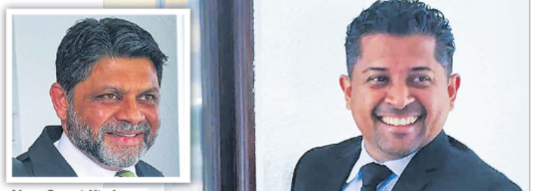ACTING Director of Public Prosecutions Nancy Tikoisuva maintains the case against former attorney-general Aiyaz Sayed-Khaiyum and former supervisor of elections Mohammed Saneem is not an employment dispute but a matter of corrupt motive and bad faith.
In her closing submissions before the High Court in Suva last Friday, Ms Tikoisuva said the case concerned the corrupt intent behind the execution of a second Deed of Variation, carried out without following constitutional processes and in a manner that granted unlawful benefits to Mr Saneem, who held a high public office at the time.
Mr Sayed-Khaiyum is charged with a count of abuse of office, committed between June 30 and July 21, 2022, while Mr Saneem faces a count of receiving a corrupt benefit between June 1 and July 31 that same year.
Ms Tikoisuva told the court that when the replacement deeds were signed, Mr Saneem instructed FEO staff to retrieve and destroy all copies of the first deed, an act that should be carefully considered by the court.
She said there was nothing inherently wrong with requesting a benefit, but “the difference lies in the process — whether it is obtained lawfully or through desperate, corruptive means”.
She said Mr Saneem knew the lawful process for securing additional benefits, but instead, used his authority over FEO staff to conceal his conduct.
Ms Tikoisuva submitted that the men’s interpretation of the law was legally flawed, dangerous, self-serving, unconstitutional, illegal, and criminal, as they used constitutional processes to advance personal motives.
She also clarified that this was not a tax case, noting that there was no allegation that Mr Saneem failed to pay taxes — all deductions were properly made and paid to the Fiji Revenue and Customs Service (FRCS). Before concluding, she asserted that the State had proven its case beyond reasonable doubt.
In response, defence lawyer Devanesh Sharma argued that under Section 136(1) of the Constitution, the remuneration and allowances of the Supervisor of Elections (SOE) could not be varied to their disadvantage during their term, except as part of an overall austerity reduction.
He said after Mr Saneem’s salary was increased to $350,000, it was reduced by 10 per cent to $315,000 in line with COVID-19 austerity measures applicable to all state officers, which was constitutionally allowed.
Mr Sharma explained that on July 6, 2022, FEO’s Romika Sewak informed Mr Saneem that from his back pay of $111,235.17 for 2021, he owed $110,840.73 in taxes, leaving him only $394.44.
Mr Saneem was understandably unhappy as the tax on his annual salary of $315,000 should have been around $67,000, not over $110,000.
Mr Sharma argued that this deduction meant Mr Saneem’s annual pay for 2021 was less than $315,000, contrary to Section 136(1), which prohibited any reduction to his disadvantage.
He said the State’s claim that Section 136 was breached by Mr Sayed-Khaiyum was misconceived and without merit, as the former attorney-general acted lawfully.
Mr Sharma further submitted Mr Saneem did not receive any additional remuneration beyond what was already approved; the Deed of Variation merely ensured he received his correct, constitutional salary.
He said the evidence showed Mr Saneem was reimbursed $54,944.03, which had been deducted from his own salary to cover additional taxes, not money paid from government funds.
“There was no tax waiver by the Government of Fiji,” Mr Sharma said, adding that any claim of financial prejudice to the state was misconceived and baseless.
He emphasised that Mr Saneem did not receive any unlawful tax relief, only a reimbursement of his own withheld earnings.
Mr Sayed-Khaiyum, he said, expected nothing in return from Mr Saneem beyond the independent performance of his duties.
Mr Sharma concluded there was no criminality in their actions, which were constitutionally and legally compliant, describing the matter as a purely employment issue that should be dismissed.
CJ Temo will deliver his verdict on February 2, 2026.



